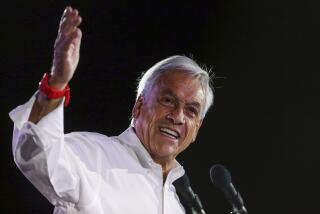Bush Hails Chile’s ‘Far-Reaching’ Democratic Reforms : South America: On the fourth leg of his trip, he meets with President Aylwin and chats with former dictator Augusto Pinochet.
- Share via
SANTIAGO, Chile — Seventeen years after a coup overthrew a democratically elected government strongly opposed by the United States, President Bush on Thursday saluted the re-establishment of Chilean democracy, which he said has been “every bit as far-reaching” as the revolutions that overthrew Communist governments in Eastern Europe last year.
“In Chile, once more, the people shall govern,” Bush said in a speech to the Chilean Congress.
For the President, it was a day of symbolism--one in which, as in Argentina a day earlier, the elements of newly inaugurated democracy barely covered up reminders of the time when military regimes tightly controlled political life and economic activity.
He met at lunch with President Patricio Aylwin, elected last December and inaugurated in March--and he shook hands and chatted briefly with Augusto Pinochet, the military dictator for 16 1/2 years. Pinochet has continued in a position of influence, as chief of the Chilean army.
Throughout the week, as Bush has traveled from Washington to Brazil, Uruguay, Argentina and over the Andes on Thursday to Chile, he has drawn attention to the renewal of democracy throughout the hemisphere and, in particular, the move toward less government control over debt-ridden economies.
The President, who winds up the tour with an overnight stop tonight in Venezuela, told the legislators: “Every year under autocratic rule served only to deepen your devotion to freedom and tolerance and respect for human rights, to strengthen Chile’s collective resolve to make this return to democracy permanent and to make it irreversible.”
On the other hand, he saluted the economic progress Chile has made over the past five years, as a result of Pinochet’s free-market policies and their acceptance by Aylwin.
Those policies, along with the political stability that the repressive Pinochet government imposed upon Chile by tightly controlling dissent, figured in the creation of an economic climate that began attracting foreign investors back to Chile. In the early 1970s, nationalization of key industries under the government of Marxist President Salvador Allende resulted in economic and political turmoil.
“Since 1985, about $2.5 billion in new investment has flowed into Chile,” the President said. “Capital flight, which has sapped the economic strength of so many Latin nations, has now reversed itself, turned around with returning funds spurring new investment here.”
He spoke at the starkly modern legislative building, still under construction in the seaside city of Valparaiso, which he reached by a 40-minute ride aboard his Marine One helicopter.
At a state dinner Thursday night in Santiago, Bush told Chileans: “You deserve your reputation as an economic model for other countries in the region and the world. Your economic growth is the pride of Latin America.”
The dinner was held at La Moneda, the presidential palace in downtown Santiago where Allende took his life as tanks and aircraft attacked in the September, 1973, coup.
White House Press Secretary Marlin Fitzwater described the reception Bush has been given here and at the three previous stops on his journey as “a love fest” compared with the unease with which South America has often regarded the United States--and with the rocky reception some U.S. politicians have received.
But the reception was not entirely friendly.
A decoy limousine driven just ahead of the President’s armored car in a motorcade was hit by an egg. And at least six bombs exploded in Santiago during the night Wednesday, before Bush arrived midday Thursday. Police reported that no one was injured.
Before the visit, the Bush Administration worked to ease some of the sore points in U.S.-Chilean relations. Last Saturday, Bush lifted a ban on military aid and sales to Chile that was imposed in 1976 after former Chilean Foreign Minister Orlando Letelier, a prominent foe of Pinochet, and an American aide, Ronni Moffit, were killed in a car bombing in Washington.
In another move also intended to patch up differences, in late November Chile was allowed back into the Generalized System of Preferences, which grants tariff concessions.
As a result, Finance Minister Alejandro Foxley has said, Chile will be able to increase exports to the United States by approximately $100 million from the present $1.45 billion a year. The Reagan Administration had excluded Chile from the system in 1988 to protest Pinochet’s repression of the Chilean labor movement.
More to Read
Sign up for Essential California
The most important California stories and recommendations in your inbox every morning.
You may occasionally receive promotional content from the Los Angeles Times.













